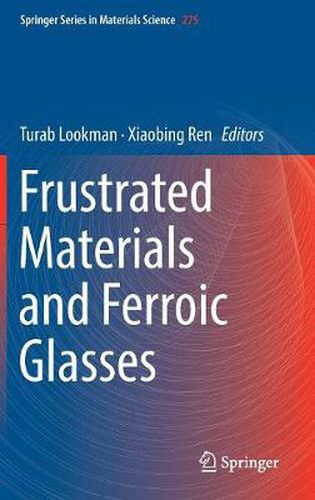Readings Newsletter
Become a Readings Member to make your shopping experience even easier.
Sign in or sign up for free!
You’re not far away from qualifying for FREE standard shipping within Australia
You’ve qualified for FREE standard shipping within Australia
The cart is loading…






This title is printed to order. This book may have been self-published. If so, we cannot guarantee the quality of the content. In the main most books will have gone through the editing process however some may not. We therefore suggest that you be aware of this before ordering this book. If in doubt check either the author or publisher’s details as we are unable to accept any returns unless they are faulty. Please contact us if you have any questions.
This book provides a comprehensive introduction to ferroics and frustrated materials. Ferroics comprise a range of materials classes with functionalities such as magnetism, polarization, and orbital degrees of freedom and strain. Frustration, due to geometrical constraints, and disorder, due to chemical and/or structural inhomogeneities, can lead to glassy behavior, which has either been directly observed or inferred in a range of materials classes from model systems such as artificial spin ice, shape memory alloys, and ferroelectrics to electronically functional materials such as manganites. Interesting and unusual properties are found to be associated with these glasses and have potential for novel applications. Just as in prototypical spin glass and structural glasses, the elements of frustration and disorder lead to non-ergodocity, history dependence, frequency dependent relaxation behavior, and the presence of inhomogeneous nano clusters or domains. In addition, there are new states of matter, such as spin ice; however, it is still an open question as to whether these systems belong to the same family or universality class.
The purpose of this work is to collect in a single volume the range of materials systems with differing functionalities that show many of the common characteristics of geometrical frustration, where interacting degrees of freedom do not fit in a lattice or medium, and glassy behavior is accompanied by additional presence of disorder. The chapters are written by experts in their fields and span experiment and theory, as well as simulations. Frustrated Materials and Ferroic Glasses will be of interest to a wide range of readers in condensed matter physics and materials science.
$9.00 standard shipping within Australia
FREE standard shipping within Australia for orders over $100.00
Express & International shipping calculated at checkout
This title is printed to order. This book may have been self-published. If so, we cannot guarantee the quality of the content. In the main most books will have gone through the editing process however some may not. We therefore suggest that you be aware of this before ordering this book. If in doubt check either the author or publisher’s details as we are unable to accept any returns unless they are faulty. Please contact us if you have any questions.
This book provides a comprehensive introduction to ferroics and frustrated materials. Ferroics comprise a range of materials classes with functionalities such as magnetism, polarization, and orbital degrees of freedom and strain. Frustration, due to geometrical constraints, and disorder, due to chemical and/or structural inhomogeneities, can lead to glassy behavior, which has either been directly observed or inferred in a range of materials classes from model systems such as artificial spin ice, shape memory alloys, and ferroelectrics to electronically functional materials such as manganites. Interesting and unusual properties are found to be associated with these glasses and have potential for novel applications. Just as in prototypical spin glass and structural glasses, the elements of frustration and disorder lead to non-ergodocity, history dependence, frequency dependent relaxation behavior, and the presence of inhomogeneous nano clusters or domains. In addition, there are new states of matter, such as spin ice; however, it is still an open question as to whether these systems belong to the same family or universality class.
The purpose of this work is to collect in a single volume the range of materials systems with differing functionalities that show many of the common characteristics of geometrical frustration, where interacting degrees of freedom do not fit in a lattice or medium, and glassy behavior is accompanied by additional presence of disorder. The chapters are written by experts in their fields and span experiment and theory, as well as simulations. Frustrated Materials and Ferroic Glasses will be of interest to a wide range of readers in condensed matter physics and materials science.